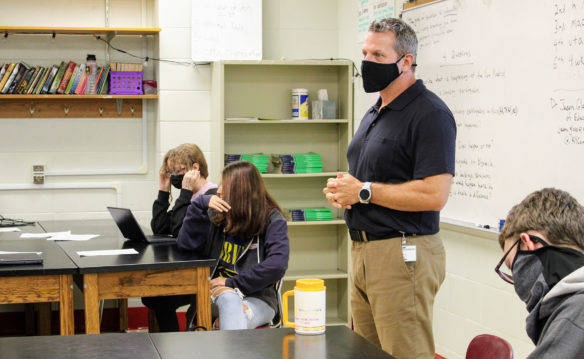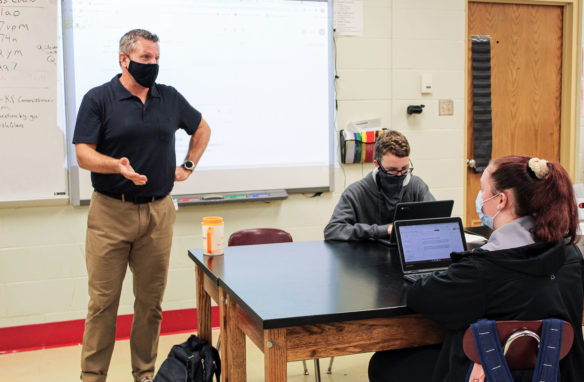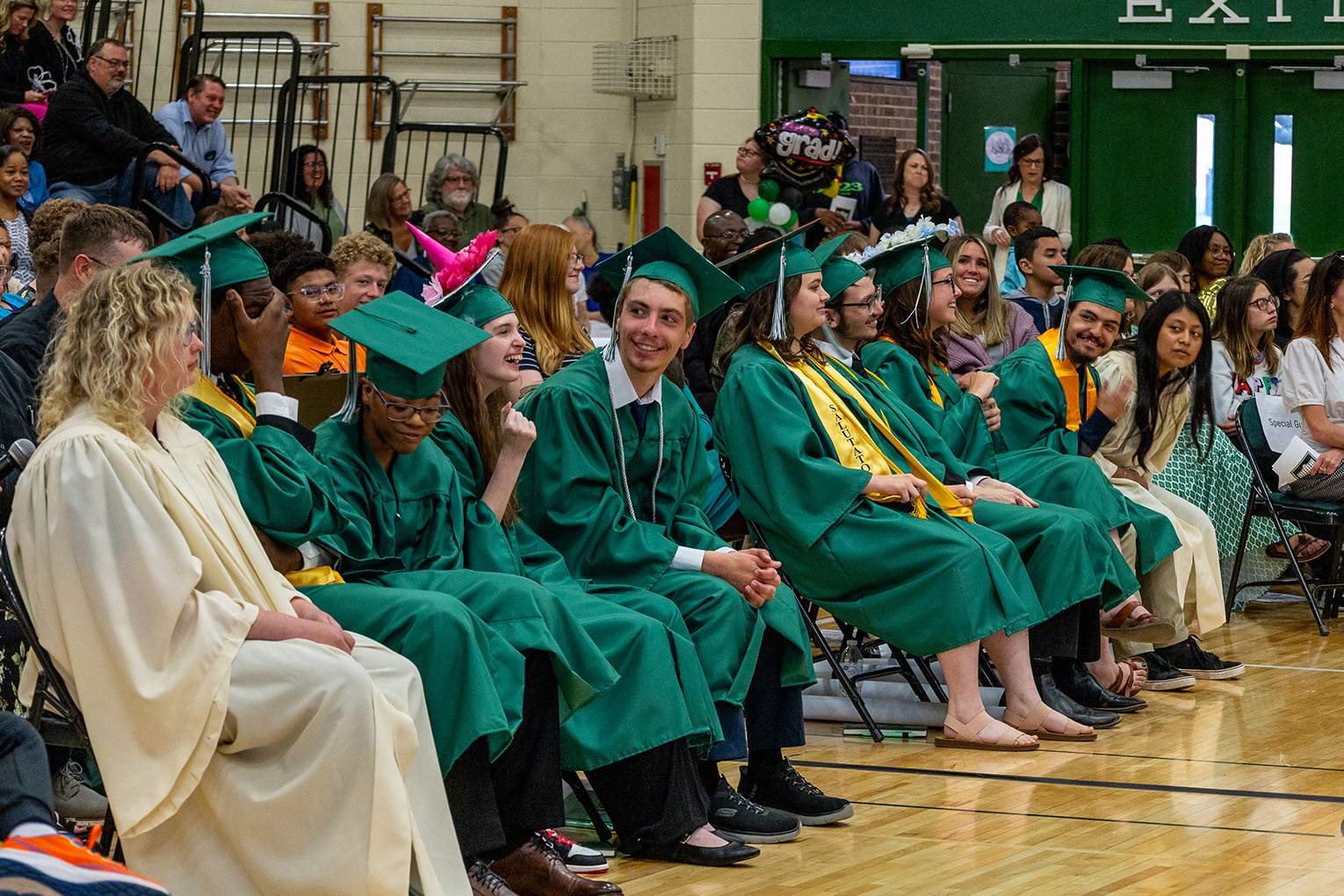
Commissioner of Education Jason E. Glass celebrated his first year as Kentucky’s commissioner of education by co-teaching a class of students on Sept. 17 at his alma mater, Meade County High School. Glass had three priorities for his first year: providing guidance for COVID-safe school operations, engaging in equity work, and managing the budgetary fallout.
Photo by Audrie Lamb, Sept. 17, 2021
To celebrate his first year at the Kentucky Department of Education (KDE), Commissioner of Education Jason E. Glass returned to his alma mater, Meade County High School, on Sept. 17 to co-teach 9th-grade science with Jonathan Mangin.
“There was an attempt to teach me mathematics in the very same room we are working in today,” he told students. “This was my 4th-grade classroom and I emphasize there was an attempt because I struggled with it.”
Glass began the lesson with a hypothetical story of a 9.0 magnitude earthquake occurring on the New Madrid fault near Arkansas. The story went on to describe the effects of the waves from the earthquake on Brandenburg, Ky. The class was asked to investigate if the story could one day be factual or would stay fictional.
Students organized themselves into small groups to work to answer the four questions guiding the discussion of content knowledge on plate tectonics, geological processes and earthquakes. Four to five different roles were divided among the small groups: 2-3 researchers, 1 writer, 1 presenter and 1 project manager.
Using their Chromebooks to create Google Docs to share findings, students worked quickly to sort through the links of information and resources provided by Mangin and Glass. The co-teachers walked around the room to help guide students’ questions and monitor their teamwork. At the end of the 20-minute research phase, groups presented their findings to the class.
This instructional method uses a problem- and project-based approach. This practice helps students develop universal skills such as critical thinking, creativity, collaboration and communication.
Glass was excited to introduce the class to a new instructional approach. This type of teaching style focuses on an “authentic demonstration of learning,” he said.
“They have responded well to this style, really like that kind of learning and want to do more of it. I think our experiment has been a success,” he said.
Mangin said he was excited to have the commissioner in his classroom for the day and the opportunity for the students to learn from him.
“I’m excited about how the students will benefit from the lesson, and not just in science class. The lesson focuses on inferences and using verifiable facts to form an answer. Students can use that in any classroom and in real-world applications,” he said.

Commissioner of Education Jason E. Glass speaks to students in Jonathan Mangin’s 9th-grade science class during a project-based lesson on plate tectonics.
Photo by Audrie Lamb, Sept. 17, 2021
Six-year educator Mangin has been teaching 9th-grade science at Meade County High School for the past four years. Mangin and Glass attended high school together – Glass was two years ahead – and even lived at the same residential complex when they attended the University of Kentucky. The pair kept in touch over the years and became lifelong friends.
Glass spent the entire day in Meade County, celebrating the school’s homecoming week and even attended the football game later in the evening.
This was Glass’ second visit to Meade County this school year. At Meade County Schools’ opening day ceremony, he presented his middle and high school choir teacher, Shirley Jones, the Greenwave Legacy Award for her 20-year career in education.
Glass said he developed his belief that “schools are the heart of communities” from growing up in Meade County.
“This community is the one that taught me how schools support the community and communities support the schools. There is this reciprocal relationship where they work together and support one another,” he said.
Year in Review
Sept. 14 marked the one-year anniversary of Glass starting work as commissioner at KDE. Glass was identified on July 10, 2020, by the Kentucky Board of Education as the next commissioner following an extensive national search.
Glass said his first year being back in Kentucky and serving as commissioner “has been incredible, despite all of the challenges.”
“It’s an honor – personally and professionally – to get to serve in the state that I grew up in and that gave so much to me,” he said.
When he first became commissioner, Glass set forth three goals: safely reopening and operating Kentucky schools amid the COVID-19 pandemic; engaging in anti-racism and equity work; and managing the budgetary fallout of the economic downturn prompted by COVID-19.
Glass said KDE has done an “exceptional” job in managing the state’s response to COVID. He said schools were able to reopen last spring because of the “clear and supportive” guidance provided by KDE on how to safely operate schools.
“I’m proud of the stance we have taken as a department and the Kentucky Board of Education has taken to try and ensure safe school operations. Schools in Kentucky have managed that as well as any school anywhere in the United States,” he said.
Providing a meaningful and quality educational experience continues through KDE’s equity work, an area in which he said “great progress” has been made in the past year.
An important step for this work was hiring Thomas Woods-Tucker, KDE’s first chief equity officer and deputy commissioner in the Office of Teaching and Learning. Glass said KDE also is working on three tools focusing on equity across the Commonwealth.
An equity dashboard will serve as a data analysis tool to provide schools and districts with a way to evaluate differences in student performance and outcomes. An equity toolkit will outline several areas where schools could consider changes to increase equitable education. An equity playbook will provide five strategic moves a school or district can enact to make a difference for students who come from disadvantaged or historically underserved backgrounds.
As he looks toward his second year as commissioner, Glass said he is excited for the work that “looks above and beyond the horizon” for Kentucky’s public education system, and ready to set “the next chapter of Kentucky’s story when it comes to education.”
The commissioner conducted a virtual listening tour from April 6 to May 6. At nine “stops,” one in each cooperative region and one in Louisville, stakeholders shared their input on long-term aspirations for the Commonwealth’s education system. Feedback from the 1,200 Kentuckians who participated in the tour will be used as a springboard for the 2021 Kentucky Education Summit.
Scheduled for Nov. 1-2 at the Kentucky International Convention Center in Louisville, the statewide summit will focus on the future of K-12 education in the Commonwealth. The event will pull in some of the nation’s top education reform leaders to help begin a discussion about how to build a stronger education system with high standards in the state.
“We hope to put in place an educational experience that prepares students for the fast-moving, globally interconnected, highly technical and automated world that they are inheriting,” he said.




Leave A Comment